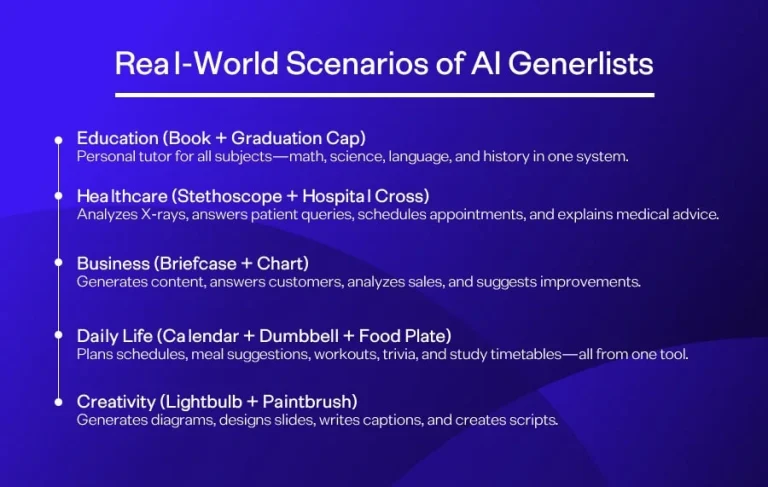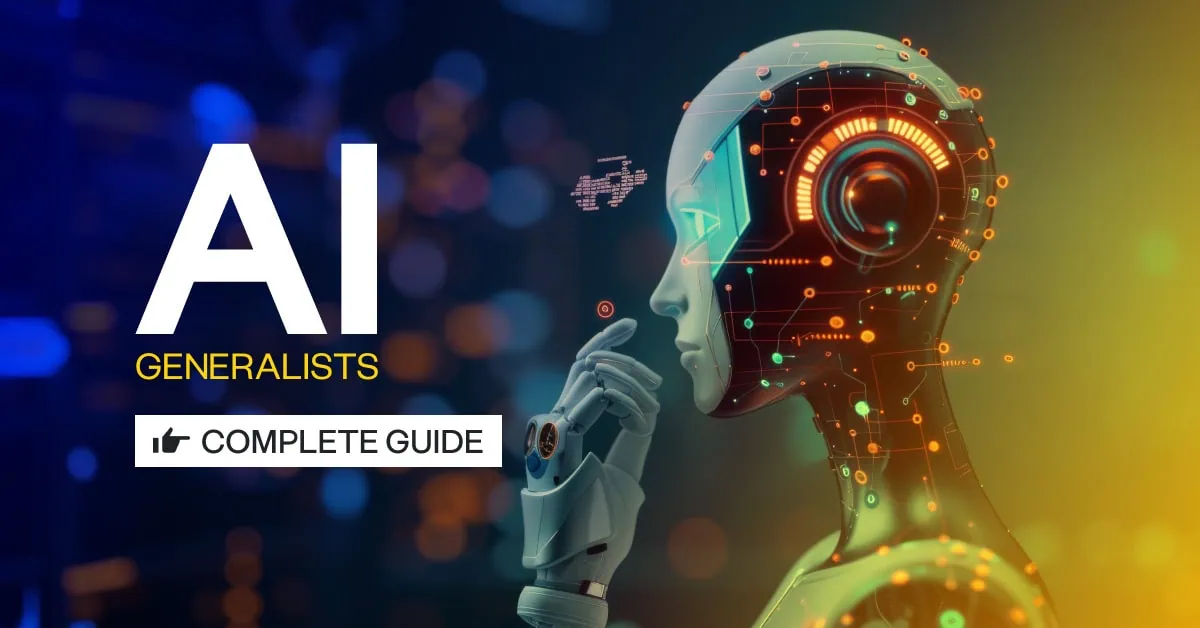Artificial Intelligence (AI) has become one of the most transformative technologies of the 21st century. From virtual assistants like Siri and Alexa to advanced tools like ChatGPT and AI-powered recommendation systems, AI is part of almost every aspect of our daily lives, often in ways we do not even notice. But not all AI systems are the same. Some are designed to perform one specific task with exceptional precision, while others, called AI generalists, are capable of performing multiple tasks across domains, making them flexible, adaptable, and more human-like. Understanding AI generalists is particularly valuable for students preparing for a future in which AI will be an integral partner in learning, work, and creativity.
Specialist AI vs. Generalist AI
Artificial Intelligence can broadly be categorised into Specialist AI and Generalist AI. While one is highly skilled in a single domain, the other is versatile across multiple areas.
| Aspect | Specialist AI | Generalist AI |
| Definition | Designed to excel in a specific task or domain. | Designed to perform multiple tasks across different domains. |
| Example | AlphaZero (chess), Medical Imaging AI (tumor detection). | ChatGPT (answering questions, writing essays, coding, creative brainstorming). |
| Strengths | Extremely accurate and powerful within its specialized area. | Versatile, adaptable, and capable of handling diverse tasks simultaneously. |
| Limitations | Cannot perform tasks outside its specialisation. | It may not match the expert-level performance of a specialist in every single area. |
| Analogy | Like a student who excels in one subject. | Like an all-rounder who performs well across subjects, sports, and creative work. |
Real-World Scenarios of AI Generalists
Scenario 1: Education
Imagine a student preparing for exams in multiple subjects. A specialist AI might help only with math homework, but a generalist AI could simultaneously assist with solving science problems, improving essay writing, learning a new language, and explaining history concepts. It is like having a personal tutor for every subject in one system.
Scenario 2: Healthcare
In hospitals, a generalist AI could be a multi-functional assistant. It could analyze X-rays, answer patient questions, schedule appointments, provide reminders for medication, and explain health procedures in simple language. In contrast, specialist AI would require multiple systems to perform each of these tasks separately.
Scenario 3: Business and Entrepreneurship
A small business owner managing marketing, customer support, and inventory could use a generalist AI to generate social media content, answer customer inquiries, analyze sales trends, and provide suggestions for improving efficiency—all in one platform. This reduces costs, saves time, and ensures smoother operations.
Scenario 4: Daily Life
Even in daily life, AI generalists make tasks easier. Imagine a student using AI to plan a weekly schedule, suggest meals based on ingredients, provide personalized workout plans, answer trivia questions, and organize a study timetable—all from one tool. A specialist AI would require multiple apps to accomplish the same tasks.
Scenario 5: Creative Projects
AI generalists are not limited to academic or administrative tasks. A student working on a school project could use AI to generate diagrams, design slides, write captions, and create a presentation script. This demonstrates the versatility and creative potential of generalist AI.

How AI Generalists Enhance Collaboration
Another exciting aspect of AI generalists is their ability to enhance teamwork and collaboration. Students working on group projects can use AI to coordinate tasks, organize research notes, generate ideas, and even simulate real-world scenarios. In workplaces, generalist AI can serve as a collaborative partner, helping multiple team members contribute to a single project efficiently. This shows that AI generalists are not just tools for individual tasks—they also improve communication, teamwork, and overall productivity.
Career Opportunities in AI Generalists
Career Paths in AI Generalists
Students exploring AI can pursue diverse and exciting roles such as:
- AI Trainers – Teach AI systems to understand language, recognize patterns, and generate meaningful content.
- AI Project Managers – Lead teams, oversee AI development, and ensure solutions meet real-world needs.
- AI Content Creators – Use AI to produce educational materials, marketing campaigns, or creative media.
- AI System Developers – Design and build platforms capable of performing multiple functions.
Industry Applications
The skills learned in generalist AI are transferable across industries:
- Education → Build intelligent tutoring systems to help students learn multiple subjects.
- Healthcare → Create AI assistants to analyze patient data, manage schedules, and guide patients.
- Business → Optimize workflows, enhance customer support, analyze data, and support decisions.
- Creative Fields → Generate art, music, designs, or interactive media by blending technology with creativity.
Benefits of a Career in AI Generalists
- Gain interdisciplinary skills that span technology, business, healthcare, and creativity.
- Develop the ability to solve complex problems and innovate across fields.
- Stay adaptable in a fast-changing technological landscape.
- Position yourself at the forefront of the AI revolution and make a meaningful impact on society.
Challenges and Advantages of AI Generalists
AI generalists are incredibly powerful tools that offer versatility, adaptability, and efficiency across multiple domains. For students, this means having a single system that can assist with coding, essay writing, creative projects, language learning, and problem-solving—all at once. They save time, enhance productivity, and provide personalized support, making learning more interactive and engaging.
In real-world scenarios, generalist AI can help students collaborate on group projects, organize research materials, and explore new skills without switching between multiple tools. However, it is important to recognize that AI generalists are not perfect. They may not match the precision of specialist AI in highly technical tasks, rely heavily on large datasets, and sometimes reflect biases present in the data. Despite these limitations, the advantages far outweigh the drawbacks: generalist AI encourages exploration, supports interdisciplinary learning, and helps develop problem-solving and creative thinking skills, preparing students for the versatile demands of the future.
The Future of AI Generalists
Researchers are working to create Artificial General Intelligence (AGI)—AI that can think, learn, and solve problems like humans. While AGI is still a long-term goal, today’s generalist AI is an essential stepping stone. Imagine a future classroom where AI tutors personalize lessons for every student, assist in collaborative projects, provide instant feedback, and adapt teaching methods to each learner’s pace. AI could even help students discover their strengths and interests, guiding career choices while supporting learning in multiple subjects.
Conclusion
AI generalists represent a new frontier in technology, as they are flexible, adaptable, and capable of performing multiple tasks across different domains. Unlike specialist AI, which excels in a single area, generalist AI mirrors the versatility of human intelligence, making it especially valuable in real-world situations where problems are complex, interconnected, and multi-faceted. From assisting students in learning multiple subjects to helping professionals manage diverse tasks in business, healthcare, and creative projects, AI generalists demonstrate the power of adaptability, efficiency, and collaboration.
For students, AI generalists are more than technological tools; they serve as examples of the value of being well-rounded and versatile. By observing how AI handles multiple tasks seamlessly, students can understand the importance of developing a broad range of skills, cultivating curiosity, and embracing interdisciplinary learning. Engaging with AI generalists also prepares students for a future where technology and human intelligence work hand in hand, enabling innovative problem-solving and creative thinking.
While these systems are powerful, they rely on large datasets, may lack the precision of specialist AI in certain tasks, and require careful ethical consideration. Despite these limitations, the advantages are significant: AI generalists save time, enhance productivity, support collaboration, and provide personalized learning experiences. In essence, AI generalists are shaping not only the future of technology but also the way we think, learn, and work. Students who embrace the principles behind AI generalists—versatility, adaptability, and continuous learning—can cultivate the mindset of an all-rounder, equipping themselves to thrive in a rapidly evolving, AI-driven world and to tackle future challenges with confidence and creativity.









